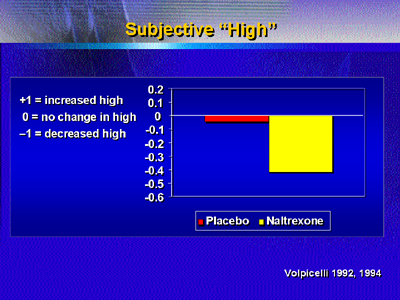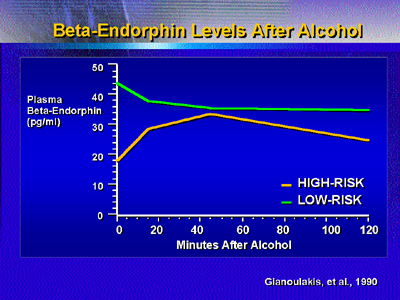|
The use of naltrexone in the treatment of alcoholism was reviewed. Alcoholics treated with naltrexone report less craving for alcohol, less drinking, fewer relapses, less reward when they do drink and no highs from drinking alcohol. Participants with high cravings for alcohol and a family history of alcoholism respond best to naltrexone.
Studies from animal models show a reduction in alcohol preference when opiate receptors are blocked. This finding has led to clinical investigations of naltrexone for alcohol abuse and dependence.
The first human study of naltrexone was conducted in a randomized trial of alcoholic male veterans in a day-treatment center. Participants were divided into two groups. One group received naltrexone and psychosocial interventions. The other group received placebo and psychosocial interventions. The naltrexone group reported less craving for alcohol and less drinking. As a result, the naltrexone-treated group had fewer relapses. When these veterans relapsed and drank, they reported less reward and no highs from drinking alcohol. This study has been replicated in different populations for long periods (9 months). These populations include females and little to no psychosocial intervention. Taken together, the results demonstrate significant benefits of naltrexone treatment.

People who receive the most benefit from naltrexone are those with a high craving for alcohol and have a family history of alcoholism. Without drinking, these alcoholics have lower plasma levels of beta-endorphin and an intense craving for alcohol. Upon drinking, plasma beta-endorphin levels increase to the same levels measured in people who report low cravings for alcohol.

These people report that the reduced cravings experienced during naltrexone treatment make recovery easier. In addition, reduced cravings allow patients to focus on other parts of their lives. Dr. O'Brien concluded that naltrexone is effective for a sub-sample of alcoholic patients.
The studies indicate that discontinuation of naltrexone treatment results in relapse of alcohol drinking. Hence, in order to receive the beneficial effects of naltrexone, participants must continue on the medication. Medication adherence is an issue with naltrexone treatment. Some patients do not comply with treatment because of the side effects. Common side effects reported with naltrexone treatment are vomiting, increased agitation, and increased sexual desire. Of these side effects, nausea is the main reason people discontinue naltrexone.
|